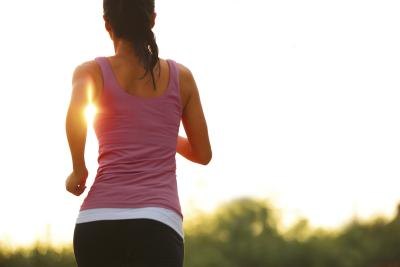
Carbohydrates are the preferred energy source for physical activity but not the only source. When you work out at high intensity, stored carbohydrates, or glycogen, provide fuel for around 20 minutes. However, during long, steady runs, glycogen stores supply energy for approximately 90 to 120 minutes. The difference is attributable to the relationship between exercise intensity and energy source. You use a higher percentage of calories from fat during a distance run than during a faster one-mile run, for example. To ascertain the amount of carbohydrate you burn during running, you need to consider several factors.
Run Fast, Run Far
Your speed and distance affect the total number of calories you burn during a run, as well as the percentage of carbohydrates and fat used to fuel the workout. Another factor that contributes to the amount of carbohydrate burned is your body weight. Your diet may also factor in, particularly if you severely limit carbohydrates. If you follow a typical diet that provides roughly 45 percent to 65 percent of calories from carbs, however, you can estimate the amount of carbohydrate you burn by considering your overall energy expenditure, exercise intensity and duration.
Calories Burned
Calories burned during running vary widely based on your speed and body weight. At a pace of 5 mph, for example, a 240-lb. person burns roughly 872 calories per hour, while a 160-lb. person burns around 584 calories. At 8 mph, energy expenditure for these body weights increases to approximately 1,472 and 986 calories per hour, respectively. The American Council on Exercise provides a physical activity calculator that estimates the number of calories burned per run based on your body weight, speed and the duration of your workout.
Fuel Sources
To determine the amount of carbohydrate you burn during a run based on your estimated calorie expenditure, you need to know approximately what percentage of the calories expended come from carbohydrates. To find this out, it helps to gauge your effort or exercise intensity. Because carbohydrates require less oxygen to burn than fat, you use more energy from glycogen as exertion intensifies. Sprinting, for example, may use fuel exclusively from carbohydrates but can be maintained for only brief periods due to oxygen limitations.
Calories and Heart Rate
You can measure exercise intensity by considering your maximum heart rate. Subtract your age from 220 to predict the maximum heart rate you're likely to achieve when exercising at your highest intensity. Check your pulse during a standard running workout to help you gauge exertion in comparison to your maximum heart rate. At 70 percent of your maximum heart rate, for example, approximately 50 percent of your fuel comes from carbohydrates. At 75 to 80 percent of maximum heart rate, carbohydrate expenditure increases to 65 percent of calories burned. If you burn 500 calories during a run at 70 percent of your maximum heart rate, then, you can estimate that 250 calories come from carbohydrates.





No comments:
Post a Comment